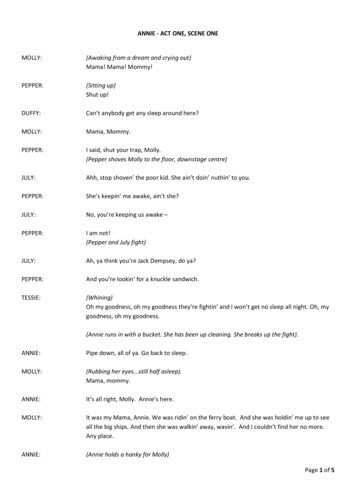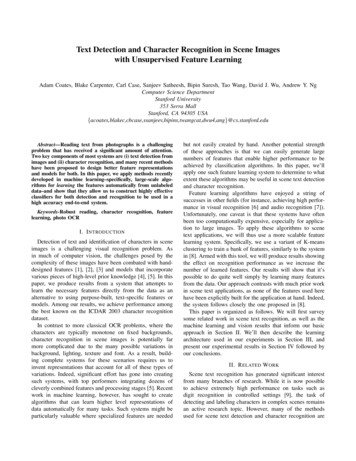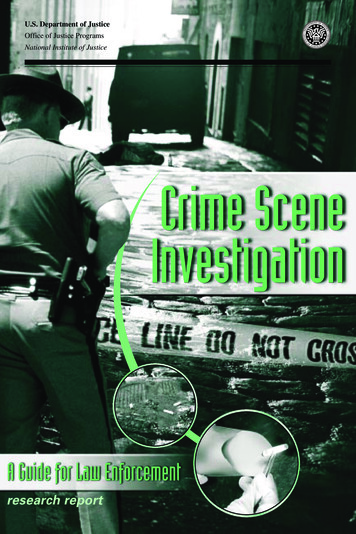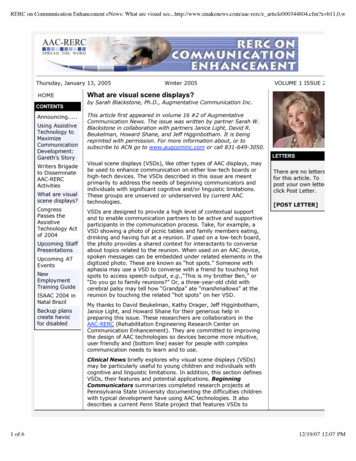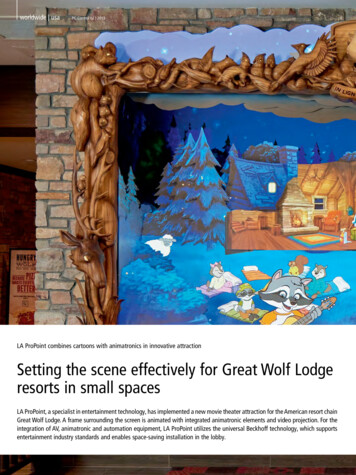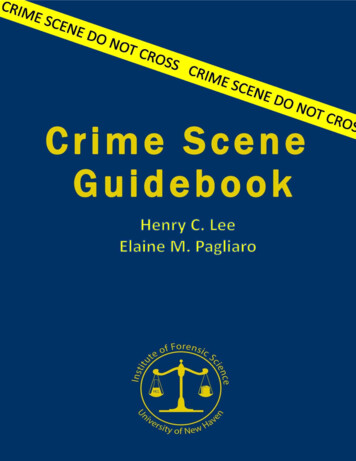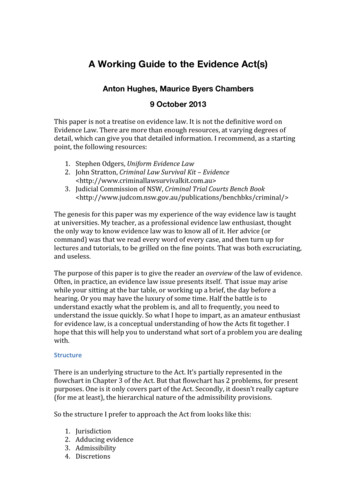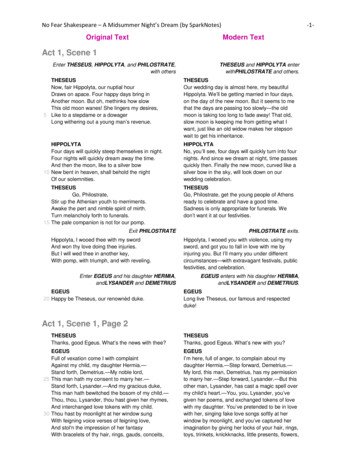
Transcription
No Fear Shakespeare – A Midsummer Night’s Dream (by SparkNotes)Original Text-1-Modern TextAct 1, Scene 1Enter THESEUS, HIPPOLYTA, and PHILOSTRATE,with othersTHESEUS and HIPPOLYTA enterwithPHILOSTRATE and others.THESEUSNow, fair Hippolyta, our nuptial hourDraws on apace. Four happy days bring inAnother moon. But oh, methinks how slowThis old moon wanes! She lingers my desires,5 Like to a stepdame or a dowagerLong withering out a young man’s revenue.THESEUSOur wedding day is almost here, my beautifulHippolyta. We’ll be getting married in four days,on the day of the new moon. But it seems to methat the days are passing too slowly—the oldmoon is taking too long to fade away! That old,slow moon is keeping me from getting what Iwant, just like an old widow makes her stepsonwait to get his inheritance.HIPPOLYTAFour days will quickly steep themselves in night.Four nights will quickly dream away the time.And then the moon, like to a silver bow10 New bent in heaven, shall behold the nightOf our solemnities.HIPPOLYTANo, you’ll see, four days will quickly turn into fournights. And since we dream at night, time passesquickly then. Finally the new moon, curved like asilver bow in the sky, will look down on ourwedding celebration.THESEUSGo, Philostrate,Stir up the Athenian youth to merriments.Awake the pert and nimble spirit of mirth.Turn melancholy forth to funerals.15 The pale companion is not for our pomp.THESEUSGo, Philostrate, get the young people of Athensready to celebrate and have a good time.Sadness is only appropriate for funerals. Wedon’t want it at our festivities.Exit PHILOSTRATEHippolyta, I wooed thee with my swordAnd won thy love doing thee injuries.But I will wed thee in another key,With pomp, with triumph, and with reveling.Enter EGEUS and his daughter HERMIA,andLYSANDER and DEMETRIUSEGEUS20 Happy be Theseus, our renownèd duke.PHILOSTRATE exits.Hippolyta, I wooed you with violence, using mysword, and got you to fall in love with me byinjuring you. But I’ll marry you under differentcircumstances—with extravagant festivals, publicfestivities, and celebration.EGEUS enters with his daughter HERMIA,andLYSANDER and DEMETRIUS.EGEUSLong live Theseus, our famous and respectedduke!Act 1, Scene 1, Page 2THESEUSThanks, good Egeus. What’s the news with thee?EGEUSFull of vexation come I with complaintAgainst my child, my daughter Hermia.—Stand forth, Demetrius.—My noble lord,25 This man hath my consent to marry her.—Stand forth, Lysander.—And my gracious duke,This man hath bewitched the bosom of my child.—Thou, thou, Lysander, thou hast given her rhymes,And interchanged love tokens with my child.30 Thou hast by moonlight at her window sungWith feigning voice verses of feigning love,And stol'n the impression of her fantasyWith bracelets of thy hair, rings, gauds, conceits,THESEUSThanks, good Egeus. What’s new with you?EGEUSI’m here, full of anger, to complain about mydaughter Hermia.—Step forward, Demetrius.—My lord, this man, Demetrius, has my permissionto marry her.—Step forward, Lysander.—But thisother man, Lysander, has cast a magic spell overmy child’s heart.—You, you, Lysander, you’vegiven her poems, and exchanged tokens of lovewith my daughter. You’ve pretended to be in lovewith her, singing fake love songs softly at herwindow by moonlight, and you’ve captured herimagination by giving her locks of your hair, rings,toys, trinkets, knickknacks, little presents, flowers,
No Fear Shakespeare – A Midsummer Night’s Dream (by SparkNotes)Original Text-2-Modern TextKnacks, trifles, nosegays, sweetmeats—messengers35 Of strong prevailment in unhardened youth.With cunning hast thou filched my daughter’s heart,Turned her obedience (which is due to me)To stubborn harshness.—And, my gracious duke,Be it so she will not here before your grace40 Consent to marry with Demetrius,I beg the ancient privilege of Athens.As she is mine, I may dispose of her—Which shall be either to this gentlemanOr to her death—according to our law45 Immediately provided in that case.and candies—things that can really influence animpressionable young person. You’ve connived tosteal my daughter’s heart, making her stubbornand harsh instead of obedient (like she shouldbe).—And, my gracious duke, if she won’t agreeto marry Demetrius right now, I ask you to let meexercise the right that all fathers have in Athens.Since she belongs to me, I can do what I wantwith her—as the law says: I can either make hermarry Demetrius—or have her killed.THESEUSWhat say you, Hermia? Be advised, fair maid:To you your father should be as a god,One that composed your beauties, yea, and oneTo whom you are but as a form in wax,50 By him imprinted and within his powerTo leave the figure or disfigure it.Demetrius is a worthy gentleman.THESEUSWhat do you have to say for yourself, Hermia?Think carefully, pretty girl. You should think ofyour father as a god, since he’s the one who gaveyou your beauty. To him, you’re like a figure thathe’s sculpted out of wax, and he has the power tokeep that figure intact or to disfigure it. Demetriusis an admirable man.Act 1, Scene 1, Page 3HERMIASo is Lysander.THESEUSIn himself he is.But in this kind, wanting your father’s voice,55 The other must be held the worthier.HERMIASo is Lysander.THESEUSYou’re right, Lysander’s admirable too. But sinceyour father doesn’t want him to marry you, youhave to consider Demetrius to be the better man.HERMIAI would my father looked but with my eyes.HERMIAI wish my father could see them with my eyes.THESEUSRather your eyes must with his judgment look.THESEUSNo, you must see them as your father sees them.HERMIAI do entreat your grace to pardon me.I know not by what power I am made bold60 Nor how it may concern my modestyIn such a presence here to plead my thoughts,But I beseech your grace that I may knowThe worst that may befall me in this case,If I refuse to wed Demetrius.HERMIAYour grace, please forgive me. I don’t know whatmakes me think I can say this, and I don’t know ifspeaking my mind to such a powerful and nobleperson as yourself will damage my reputation formodesty. But please, tell me the worst thing thatcould happen to me if I refuse to marryDemetrius.THESEUS65 Either to die the death or to abjureForever the society of men.Therefore, fair Hermia, question your desires.Know of your youth. Examine well your blood—Whether, if you yield not to your father’s choice,70 You can endure the livery of a nun,For aye to be in shady cloister mewed,To live a barren sister all your life,Chanting faint hymns to the cold, fruitless moon.Thrice-blessèd they that master so their blood75 To undergo such maiden pilgrimage.But earthlier happy is the rose distilledTHESEUSYou’ll either be executed or you’ll never seeanother man again. So think carefully about whatyou want, beautiful Hermia. Consider how youngyou are, and question your feelings. Then decidewhether you could stand to be a nun, wearing apriestess’s habit and caged up in a cloisterforever, living your entire life without a husband orchildren, weakly chanting hymns to the cold andvirginal goddess of the moon. People who canrestrain their passions and stay virgins foreverare holy. But although a virgin priestess might berewarded in heaven, a married woman is happier
No Fear Shakespeare – A Midsummer Night’s Dream (by SparkNotes)Original TextThan that which, withering on the virgin thorn,Grows, lives, and dies in single blessedness.-3-Modern Texton Earth. A married woman is like a rose who ispicked and made into a beautiful perfume, while apriestess just withers away on the stem.Act 1, Scene 1, Page 4HERMIASo will I grow, so live, so die, my lord,80 Ere I will my virgin patent upUnto his lordship, whose unwishèd yokeMy soul consents not to give sovereignty.HERMIAI’d rather wither away than give up my virginity tosomeone I don’t love.THESEUSTake time to pause, and by the next new moon—The sealing day betwixt my love and me85 For everlasting bond of fellowship—Upon that day either prepare to dieFor disobedience to your father’s will,Or else to wed Demetrius, as he would,Or on Diana’s altar to protest90 For aye austerity and single life.THESEUSTake some time to think about this. By the timeof the next new moon—the day when Hippolytaand I will be married—be ready either to beexecuted for disobeying your father, to marryDemetrius as your father wishes, or to take avow to spend the rest of your life as a virginpriestess of the moon goddess.DEMETRIUSRelent, sweet Hermia—And, Lysander, yieldThy crazèd title to my certain right.DEMETRIUSPlease give in, sweet Hermia.—And Lysander,stop acting like she’s yours. I’ve got more of aright to her than you do.LYSANDERYou have her father’s love, Demetrius.Let me have Hermia’s. Do you marry him.LYSANDERHer father loves you, Demetrius. So why don’tyou marry him and let me have Hermia?EGEUS95 Scornful Lysander, true, he hath my love,And what is mine my love shall render him.And she is mine, and all my right of herI do estate unto Demetrius.EGEUSIt’s true, rude Lysander, I do love him. That’s whyI’m giving him my daughter. She’s mine, and I’mgiving her to Demetrius.LYSANDER(to THESEUS) I am, my lord, as well derived as he,100 As well possessed. My love is more than his.My fortunes every way as fairly ranked,(If not with vantage) as Demetrius'.And—which is more than all these boasts can be—I am beloved of beauteous Hermia.105 Why should not I then prosecute my right?Demetrius, I’ll avouch it to his head,Made love to Nedar’s daughter, Helena,And won her soul. And she, sweet lady, dotes,Devoutly dotes, dotes in idolatry110 Upon this spotted and inconstant man.LYSANDER(to THESEUS) My lord, I’m just as noble and richas he is. I love Hermia more than he does. Myprospects are as good as his, if not better. Andbeautiful Hermia loves me—which is moreimportant than all those other things I’m braggingabout. Why shouldn’t I be able to marry her?Demetrius—and I’ll say this to his face—courtedNedar’s daughter, Helena, and made her fall inlove with him. That sweet lady, Helena, lovesdevoutly. She adores this horrible and unfaithfulman.Act 1, Scene 1, Page 5THESEUSI must confess that I have heard so muchAnd with Demetrius thought to have spoke thereof,But being overfull of self-affairs,My mind did lose it.—But, Demetrius, come.115 And come, Egeus. You shall go with me.THESEUSI have to admit I’ve heard something about that,and meant to ask Demetrius about it, but I wastoo busy with personal matters and it slipped mymind.—Anyway, Demetrius and Egeus, both ofyou, come with me. I want to say a few things to
No Fear Shakespeare – A Midsummer Night’s Dream (by SparkNotes)Original TextI have some private schooling for you both.—For you, fair Hermia, look you arm yourselfTo fit your fancies to your father’s will,Or else the law of Athens yields you up120 (Which by no means we may extenuate)To death, or to a vow of single life.—Come, my Hippolyta. What cheer, my love?—Demetrius and Egeus, go along.I must employ you in some business125 Against our nuptial and confer with youOf something nearly that concerns yourselves.EGEUSWith duty and desire we follow you.Exeunt. Manent LYSANDER and HERMIALYSANDERHow now, my love? Why is your cheek so pale?How chance the roses there do fade so fast?-4-Modern Textyou in private.—As for you, beautiful Hermia, getready to do what your father wants, becauseotherwise the law says that you must die orbecome a nun, and there’s nothing I can doabout that.—Come with me, Hippolyta. How areyou, my love?—Demetrius and Egeus, come withus. I want you to do some things for our wedding,and I also want to discuss something thatconcerns you both.EGEUSWe’re following you not only because it is ourduty, but also because we want to.They all exit except LYSANDER and HERMIA.LYSANDERWhat’s going on, my love? Why are you so pale?Why have your rosy cheeks faded so quickly?HERMIA130 Belike for want of rain, which I could wellBeteem them from the tempest of my eyes.HERMIAProbably because my cheeks' roses needed rain,which I could easily give them with all the tears inmy eyes.LYSANDERAy me! For aught that I could ever read,Could ever hear by tale or history,The course of true love never did run smooth.135 But either it was different in blood—LYSANDEROh, honey! Listen, in books they say that truelove always faces obstacles. Either the lovershave different social standings—Act 1, Scene 1, Page 6HERMIAO cross! Too high to be enthralled to low.HERMIAOh, what an obstacle that would be! Imaginebeing too high on the social ladder, and falling inlove with someone beneath you.LYSANDEROr else misgraffèd in respect of years—LYSANDEROr else they were very different ages—HERMIAO spite! Too old to be engaged to young.HERMIAHow awful! Being too old to marry someoneyoung.LYSANDEROr else it stood upon the choice of friends—LYSANDEROr else their guardians and advisors said no—HERMIA140 O hell, to choose love by another’s eyes!HERMIAWhat hell, to have your love life determined bysomeone else!LYSANDEROr, if there were a sympathy in choice,War, death, or sickness did lay siege to it,Making it momentary as a sound,Swift as a shadow, short as any dream,145 Brief as the lightning in the collied night;That, in a spleen, unfolds both heaven and Earth,And ere a man hath power to say “Behold!”The jaws of darkness do devour it up.LYSANDEROr, even if the lovers are a good match, theirlove might be ruined by war, death, or sickness,so that the affair only lasts an instant. Their timetogether might be as fleeting as a shadow or asshort as a dream, lasting only as long as it takesa lightning bolt to flash across the sky. Beforeyou can say “look,” it’s gone. That’s how intensethings like love are quickly destroyed.
No Fear Shakespeare – A Midsummer Night’s Dream (by SparkNotes)Original Text-5-Modern TextSo quick bright things come to confusion.HERMIA150 If then true lovers have been ever crossed,It stands as an edict in destiny.Then let us teach our trial patience,Because it is a customary cross,As
No Fear Shakespeare – A Midsummer Night’s Dream (by SparkNotes) -3- Original Text Modern Text Than that which, withering on the virgin thorn, Grows, lives, and dies in single blessedness. on Earth. A married woman is like a rose who is picked and made into a beautiful perfume, while a priestess just withers away on the stem. Act 1, Scene 1, Page 4 80 HERMIA So will I grow, so live, so die .File Size: 472KBPage Count: 65
